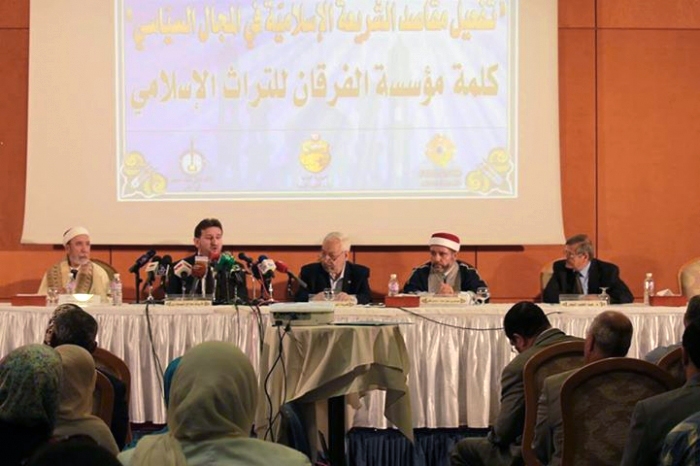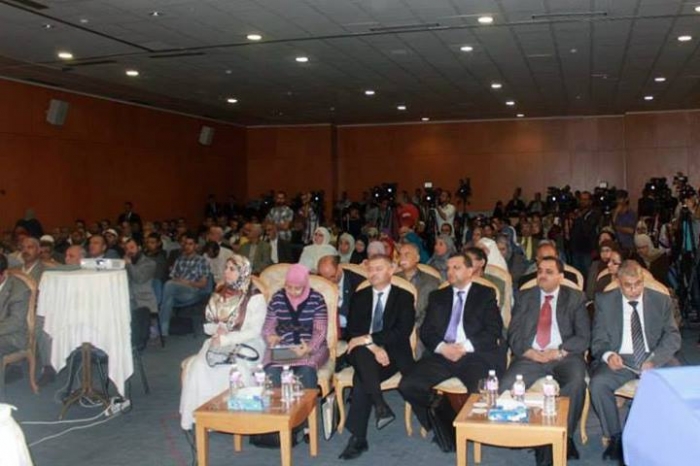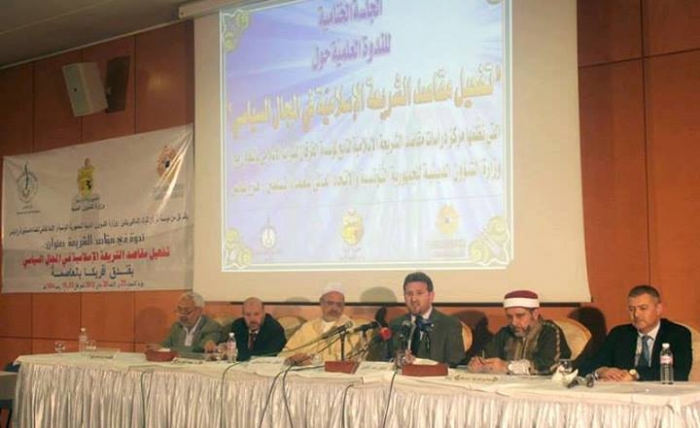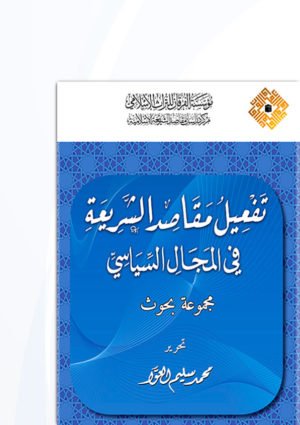Al-Furqān Islamic Heritage Foundation - Centre for the Study of the Philosophy of Islamic Law, in co-operation with the Ministry of Religious Affairs of Tunisia as well as the International Union of Muslim Scholars - the Tunisia Branch organised a symposium on the theme of “The Activation of the Objectives of Sharīʿah in the Political Sphere”. The symposium was held at Hotel Afrika in Tunis, Tunisia, on the 25th and 26th of May 2013, and was attended by the Minister for Religious Affairs of Tunisia, Dr Nour al-Din al-Khadimi, the Vice-Chairman of the International Union of Muslim Scholars, sheikh Rashid al-Ghannouchi, the Chairman of the Tunisia Branch of the International Union of Muslim Scholars, Dr Abdul-l-Majeed al-Najjar and the Mufti of Tunisia, sheikh Othman Battikh.

In the opening session of the symposium, Mr Sali Shahsivari, the Managing Director of Al-Furqān, spoke about the work and the activities carried out by the Centre for the Study of the Philosophy of Islamic Law, which was established initially with the aim to revive the knowledge of maqāṣid (objectives). He said that the organisers of this symposium want to transfer the idea of maqāṣid (objectives) from theory to practice, through practical research on topics related to the constitution, civil state, citizenship and other matters covered by the objectives of Sharīʿah. He also highlighted the sensitive and intricate nature of the subject and its philosophy, within the rapidly changing world of politics, with all the risks and heavy burdens it carries in a modern post revolution society.
The Minister of Religious Affairs of Tunisia, Dr Nour al-Din al-Khadimi, expressed his view that the nature of a state, from an Islamic perspective, was that it was civic and not theocratic. He pointed out that all citizens affiliate with the state as citizens and humans, not on the basis of religion, lineage or sect. He also pointed out that the philosophy of civil society and citizenship were undeniably part of a holistic Islamic ethical outlook. He added that the aim of the symposium was to try and initiate a solid foundation in these areas, in addition to building a modern civilisation which embodies the maqāṣid al-Sharīʿah (objectives of Islamic law).
Dr al-Khadimi also stressed the importance of maqāṣid al-Sharīʿah (objectives of Islamic law) and its propensity to go beyond the arena of jurisprudence in organising the social life of the Muslim Ummah.
He added that, in having this symposium in Tunisia, it gains a unique standing in being at the crossroads “of a historically unique moment characterised by a true spirit of revolution that has permeated and exhibited itself in Tunisa’s political, social and intellectual makeup”.

Sheikh Rashid al-Ghannouchi added that current revolutions have provided an opportunity to apply the maqāṣid al-Sharīʿah (objectives of Islamic law) and begin a dialogue between the revealed texts and the changing contexts in a direction that made use of modern developments within an Islamic framework. He added that all parliamentarians, be they of a legal background or of a Sharīʿah background, through their drafting of the constitution, were trying to reconcile and bring together the objectives of the religion of Islam and modernity in the areas of human rights and democracy.
The Chairman of the Tunisia Branch of the International Union of Islamic Scholars, Dr Abdul-l-Majeed al-Najjar, added that debate within the political sphere was one of the liveliest, yet when it came to the revealed texts related to this area, one found that the texts only spoke in general terms. This, he explained, was an indication that the objective of the Sharīʿah here was to allow individuals to arrive at their own conclusions and make their own decisions, so that the law would always be suited to their current circumstances. He also expressed his hopes of establishing a project in Islamically minded law-making, which would serve to protect Tunisia from the errors of current widespread political orders.
Sheikh Othman Battikh, the Mufti of Tunisia, expressed his appreciation of the theme and timing of the symposium. He articulated his feelings that such initiatives lay the foundations for future projects and facilitated ijtihād (legal reasoning), in order to reach policies that afford due consideration to maṣlaḥah (interest), one of the most important cornerstones of the science of maqāṣid (objectives).

The symposium then had a series of lectures, presented by several Islamic thinkers, which revolved around maqāṣid (objectives) and establishing juridical principals for al-Siyāsah al-Sharīʿīyah (the political dimension of Sharīʿah) and their use in the revolution. The participants discussed the methodology of maqāṣid (objectives) within the framework of past and present studies. They looked at specific topics on citizenship in the light of Sharīʿah and maqāṣid (objectives). This included, in particular, articles on the constitution and modern legislation. Maqāṣid (objectives) in reference to laws and regulations, pertaining to work and associated legal rights, were also discussed during the proceedings.
On the second day, a number of lectures presented the maqāṣidi (an objective oriented approach) foundations of pluralism, the natural changing of governments between parties and the international treaties on human rights.
Areas covered included maqāṣid (objectives) in the traditional sources and the maqāṣid (objectives) analysis of taking office, where Islamically illegal elements were inextricably linked to the post. The participants also looked at ijmaʿ (consensus) in relation to parliament. Other areas included maqāṣid (objectives) in civil society and the maqāsid (objective) of freedom in contemporary Islamic jurisprudence. This included the area of autonomy between state instruments, namely separation of the state executive and the judiciary. The theme of justice and contemporary Islamic jurisprudence was also discussed.

At the conclusion of the symposium, a lively debate took place between the lecturers and participants, specifically looking at how maqāṣid (objectives) could be a framework of reference for political work.
Awards for a competition on “The role of the Zaytuna scholars in renewing Maliki fiqh”, run by the International Union of Islamic Scholars, concluded the evening’s proceedings.


